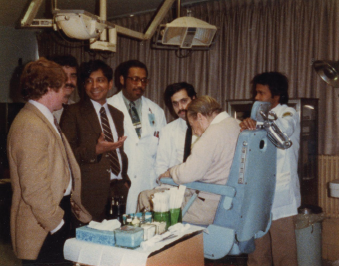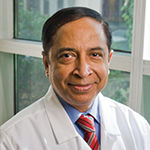Welcome to ENTtoday’s inaugural edition of “The Voice,” a column that will feature interviews by Sarah K. Rapoport, MD, of surgeons, researchers, and other readers to highlight human stories that represent who we are holistically. Each of us has personalized narratives of our personal and professional journeys, triumphs, and tribulations and, collectively, these stories have influenced and enriched others in our otolaryngology community and beyond. Many of our stories are untold, as most of us know one another by our “accomplishments” and become known for our “expertise” in various subspecialties.
Explore This Issue
December 2019Alex Chiu and I had the pleasure of meeting Dr. Rapoport recently at the AAO–HNS annual meeting in New Orleans. We were quite impressed by Sarah, whose vision for this column was inspired by the “Corner Office” in The New York Times. Each edition of “The Voice” will present human stories through short, documented interviews in each subject’s own voice. We hope this column will entertain and inspire you. Please provide us with your feedback and suggestions for colleagues whom you would like Sarah to interview, and let us know if you would like to share your own story. Send suggestions and comments to enttoday@wiley.com.
Julie Wei, MD
Associate Editor, ENTtoday
Meet Ashok R. Shaha, MD. Born in 1948 in Bastawade, Maharashtra, India—a town south of Mumbai—Dr. Shaha currently holds the Jatin P. Shah Chair in Head and Neck Surgery at Memorial Sloan Kettering Hospital in New York City, and is one of the world’s most respected head and neck oncology and endocrine surgeons.
After graduating from the Maharaja Sayajirao University Medical School in the city of Vadodara, India, Dr. Shaha completed a general surgery residency and a surgical oncology fellowship in Mumbai. When he came to the United States in 1975, at age 27, with $8 in his pocket, he was required to repeat his entire residency from the PGY1 level forward.
Decades later, as an attending surgeon with a magnetic and animated personality, Dr. Shaha laughs as he admits that, even half a lifetime later, he still recalls the agonies of the long days in his residency retraining in the United States. By that time, he had a young son and a wife who had also emigrated from India and was herself training as a pediatrician.
Yet, Dr. Shaha has never lost sight of his humble upbringing. In everything he does, he carries with him the nonviolent values of the Jain religion, in which he was steeped from childhood. Said Dr. Shaha: “My culture taught me not to put anyone down—the janitor, the OR nurses, the residents, and students—you must remember that every person around you comprises your team.”
Dr. Shaha is certain that his positive attitude, as well as the steadfast support of his extended family, sustained him through those years. “I would tell myself, ‘If you’re honest and you work hard, nobody can hold you back.’”
This interview, condensed and edited for clarity, was conducted via phone in September 2019.
Dr. Rapoport: What was your childhood like?
Dr. Shaha: I was born into a very modest family. I lost my mother when I was very young. I have no memory of her. My father was a small shopkeeper who raised me along with my three elder brothers. My eldest brother was a professor in economics and he pushed us all to work hard and pursue careers. My second brother was a college principal and the third is a most successful lawyer. My eldest brother’s wish was for me to become a doctor because there were no physicians in my family. Since we lived a life of very modest means, our expenditures were reserved for what was most essential: our education. It was the most important thing in life to us. Only one of my brothers is still alive—the other two we lost—and their five children are doctors, so now everyone in the family is interested in going into medicine!
SR: Was it hard to attend medical school so far from your family?
AS: Yes. Mainly, it was difficult trying to meet the finances. I was admitted to medical school based on merit, and I received some scholarships that were quite helpful, but my brothers went out of their way to support me financially.
My school was located 400 miles north of where I grew up, so I had to move from one state to another, to a place called Baroda, which was north of Mumbai. It was a highly educational town, and I would say, from my class, about 75% of the graduates are now in the United States. Watching so many others emigrate for the hope of a better future provided me with the optimistic mentality of “If he can do it, I can do it!”
SR: Can you tell us the story of that first trip from India to New York City?
AS: Believe it or not, I left India with only $8 in my pocket because that was the largest amount I could take out from the Reserve Bank of India. So, I landed in New York City without enough money even for a taxi. And since I did not want the cost of my trip to be taxing on my family or my brothers, I flew on TWA using a scheme they called, “Fly Now, Pay Later.” So, I flew to the United States without paying for my ticket. Obviously, after I came here, I eventually paid off the cost with interest, but it was quite daunting to travel from India to the United States not having a job in hand, not knowing with whom I was going to stay. But friends who had come to America ahead of me were very helpful. Dr. Jatin Shah helped me throughout my academic career.
Religion has very little to do with the actual practice of medicine, but it has shaped my attitude—specifically, my attitude toward other people, my respect for other people—that I not hurt anybody, either in my thoughts or in what I do. And these behaviors are at the core of my practice of medicine. —Ashok R. Shaha, MD
SR: Your immigrant story is quite powerful. How did it feel to complete your residency for a second time?
AS: Yes, I did it twice, and it was hard both times. I will tell you, for all people it is a hard training. Surgical residency within otolaryngology and general surgery—it is all hard work. It was interesting because, to some extent, the second time around I was ahead of my peers. I already knew the subject matter very well. I knew how to care for patients and perform the surgeries. But, at the same time, I had a wife and a child, which were new challenges for me. I learned that what is most important is the understanding between husband and wife. If there is good understanding and support of each other, everything is easy. And, you know, my wife devoted quite a bit on my behalf. Because even though she is a pediatrician, she largely sacrificed her career for me. If that understanding between spouses is not there, then there are always going to be friction and clashes, especially when there are children. I think it is not easy to raise a child when both parents are working hard. It was much harder for my wife because she had to take care of our home and family. Without my wife, I could not have done it.
SR: Do you often look back on those years of completing residency training a second time, or do they feel like distant memories at this point?

Dr. Shaha, center, leading teaching rounds with his residents and medical students while chief of head and neck surgery at the Veterans Affairs Hospital in Brooklyn, N.Y., in 1988.
AS: Oh no, I remember those days very often, but, through the years, I have learned to keep a positive attitude. I think the United States is one place where, if you are good at what you do, if you work hard, the success is always there. I have never felt anybody pushing me down.
SR: You have told me that you hold deep religious beliefs from childhood. Do you think being a religious person has informed the way you practice medicine?
AS: Not really. Religion has very little to do with the actual practice of medicine, but it has shaped my attitude—specifically, my attitude toward other people, my respect for other people—that I not hurt anybody, either in my thoughts or in what I do. And these behaviors are at the core of my practice of medicine.
SR: Are there lessons you’ve learned through your training experiences that you feel are important to pass along to other trainees or to your colleagues?
AS: Yes. And I think of these points often: Face every new patient as a challenge. This is No. 1. Treat the patient just as you’d treat your own family. Make the best decisions that are in the interest of the patient, keeping in mind that every patient is unique. You must adjust your judgement based on the patient’s understanding of his circumstances, his disease, and remember to consider his quality of life. That is No. 1.
No. 2, enjoy what you are doing. Don’t think you are doing it either for money or that it is a chore. That is why I say, each day when I arrive to work in the morning, “I am going to have a good day.” And when I go home, I say, “It was a great day. I learned a lot, and I am where I want to be.” I think if you have that attitude, everything is simple.
SR: That is a commendable perspective. What do you do on days that are hard, when it is difficult to say, “Today was great”?
AS: There are hard days when you are frustrated with some complications. Surgeons are one community who do not like complications, and I lose sleep very easily when I have a complication. We all have had such moments. There is not a single surgeon who won’t experience that feeling. But you learn from every complication. And it makes you more humble every day.
 Sarah K. Rapoport, MD, is a chief resident in otolaryngology/head & neck surgery at Georgetown University Hospital in Washington, D.C.
Sarah K. Rapoport, MD, is a chief resident in otolaryngology/head & neck surgery at Georgetown University Hospital in Washington, D.C.